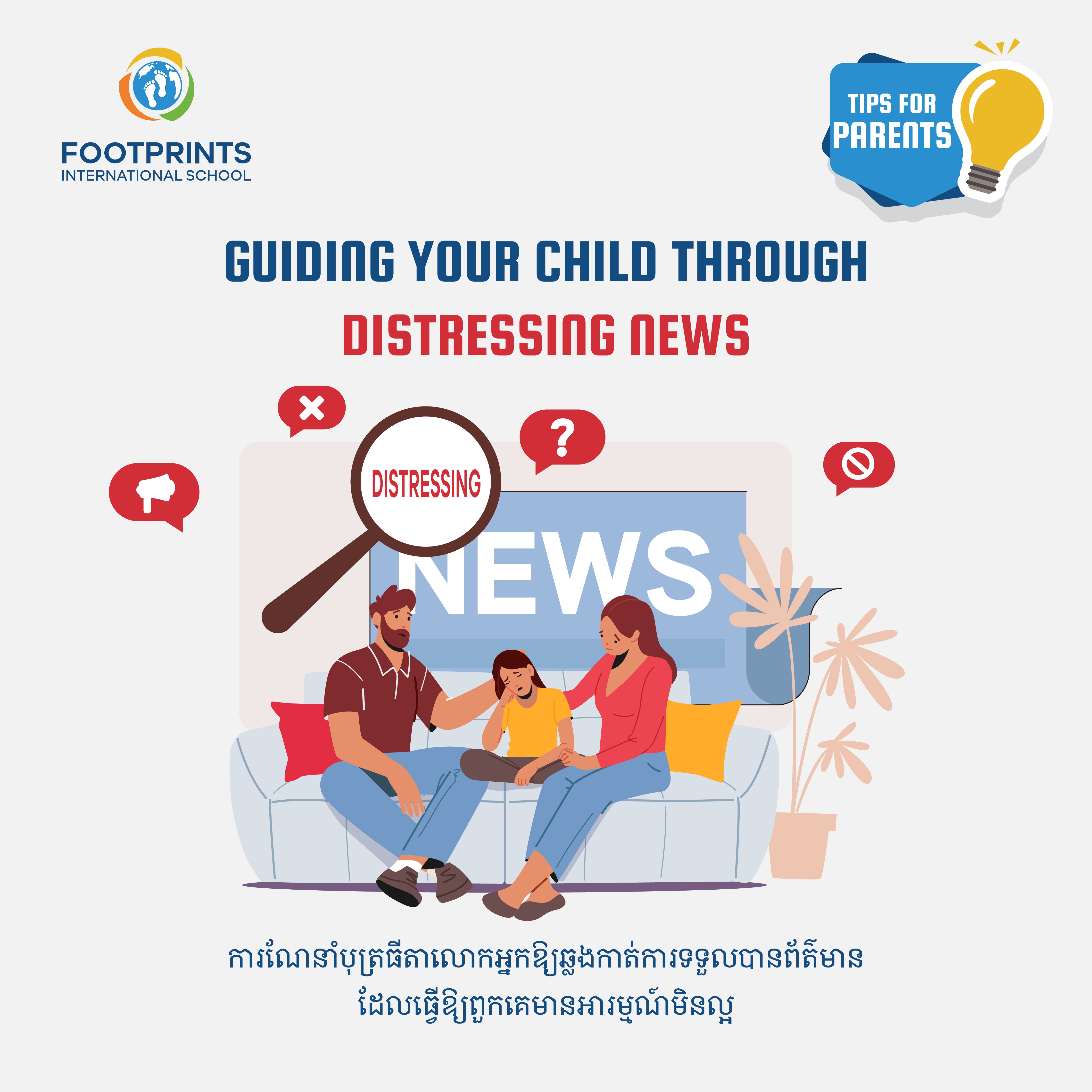
This article offers guidance on how to handle sensitive discussions with children who may have encountered distressing news online. While youngsters may not possess a precise understanding of the geographic or political contexts of such events, today’s digital landscape exposes them to global incidents, including those in places like Israel. This heightened awareness can understandably trigger emotional distress in children.
In this piece, we provide practical suggestions for supporting children in navigating upsetting online content, whether it pertains to current events like those in Israel, ongoing environmental concerns, the war in Ukraine, or any other challenging topic. These recommendations aim to assist parents and guardians in helping children process their emotions effectively.
Adapted from National Online Safety (NOS) – National College: https://nationalcollege.com/guides/upsetting-content
អត្ថបទនេះផ្តល់ការណែនាំអំពីរបៀបគ្រប់គ្រងការពិភាក្សាអំពីរឿងដែលអាចប៉ះពាល់ដល់អារម្មណ៍ជាមួយ កុមារដែលអាចនឹងជួបប្រទះព័ត៌មានដែលធ្វើឱ្យពួកគេមានអារម្មណ៍មិនល្អនៅលើប្រព័ន្ធអុីនធឺណិត។ នៅពេលដែលកុមារអាចមិនទាន់មានការយល់ដឹងច្បាស់លាស់អំពីភូមិសាស្ត្រ ឬស្ថានភាពនយោបាយនៃ ហេតុការណ៍ទាំងនោះ ប្រព័ន្ធឌីជីថលសព្វថ្ងៃបានបង្ហាញពួកគេអំពីហេតុការណ៍នៅជុំវិញពិភពលោក រួមទាំងទីកន្លែងជាច្រើន ដូចជាប្រទេសអុីស្រាអែលជាដើម។ ការដឹងកាន់តែច្រើនទាំងនេះ អាចនឹងធ្វើឱ្យមានផលប៉ះពាល់លើអារម្មណ៍របស់កុមារតូចៗ។
នៅក្នុងអត្ថបទនេះ យើងខ្ញុំនឹងផ្តល់យោបល់ដែលអាចអនុវត្តបានមួយចំនួនសម្រាប់ជួយដល់កុមារក្នុងការឆ្លង
កាត់ខ្លឹមសារព័ត៌មាននៅលើប្រព័ន្ធអុីនធឺណិតដែលធ្វើឱ្យពួកគេមិនសប្បាយចិត្ត មិនចំពោះហេតុការណ៍ដែល ទើបនឹងកើតឡើងថ្មីៗ ដូចជានៅប្រទេសអុីស្រាអែល កង្វល់អំពីបរិស្ថានដែលនៅតែបន្តមានសង្រ្គាមនៅ
ប្រទេសអ៊ុយក្រែន ឬប្រធានបទដែលពិបាកទទួលយកបានផ្សេងៗទៀត។ ការណែនាំនេះ គឺដើម្បីជួយមាតា បិតា និងអាណាព្យាបាលសិស្សក្នុងការជួយឱ្យកុមារដំណើរការអារម្មណ៍របស់ពួកគេយ៉ាងមានប្រសិទ្ធភាព។
១. ស្វែងយល់បន្ថែមអំពីអ្វីដែលបុត្រធីតាលោកអ្នកដឹង
មានវិធីជាច្រើនដែលធ្វើឱ្យកុមារដឹងពីព័ត៌មានដែលធ្វើឱ្យពួកគេសោកសៅនៅលើប្រព័ន្ធផ្សព្វផ្សាយ អុីនធឺណិត និងនៅខាងក្រៅ។ មុនពេលប្រាប់បុត្រធីតាលោកអ្នកនូវព័ត៌មានបន្ថែមដែលអាចនឹងធ្វើឱ្យពួកគេពិបាកទទួល យក សូមស្វែងយល់ពីអ្វីដែលពួកគេបានដឹងជាមុនសិន។ បង្ហាញប្រាប់ពួកគេថាលោកអ្នកចាប់អារម្មណ៍ពីអ្វី ដែលពួកគេនិយាយប្រាប់លោកអ្នក។ នេះគឺជាឱកាសដ៏ល្អសម្រាប់លោកអ្នកក្នុងការអនុវត្តការស្តាប់ដោយ យកចិត្តទុកដាក់ក្នុងនាមជាមាតាបិតា ឬអាណាព្យាបាលម្នាក់។ ព្យាយាមស្វែងយល់ថាព័ត៌មាននេះប៉ះពាល់ ដល់បុត្រធីតាលោកអ្នកកម្រិតណា។
២. លើកទឹកចិត្តឱ្យមានការពិភាក្សាដោយបើកចំហនៅកន្លែងដែលមានសុវត្ថិភាព
ព័ត៌មានដែលមានបញ្ហា គឺនៅពាសពេញប្រព័ន្ធអុីនធឺណិត ហើយបុត្រធីតាលោកអ្នកអាចនឹងឃើញព័ត៌មាន ទាំងនោះ។ ទោះបីជាខ្លឹមសារមិនសមរម្យ លើកទឹកចិត្តឱ្យពួកគេនិយាយជាមួយលោកអ្នកអំពីអ្វីដែលពួកគេ បានឃើញ ឬបានឮ ដោយមិនខឹងពួកគេ។ នេះមិនមែនជាកំហុសពួកគេឡើយ ហើយការខឹងក៏មិនបានបង្កើត បរិយាកាសដែលមានសុវត្ថិភាពដែរ។ កុមារគឺកំពុងរៀនឱ្យដឹងថាអ្វីដែលពួកគេឃើញនៅលើប្រព័ន្ធអុីនធឺណិត ទាំងអស់មិនសុទ្ធតែជាការពិតនោះទេ ដូច្នេះហើយលោកអ្នកត្រូវក្លាយជាប្រភពព័ត៌មានចម្បងរបស់ពួកគេ មិនមែនឱ្យពួកគេពឹងផ្អែកលើឧបករណ៍អេឡិចត្រូនិចឡើយ។ នេះមានន័យថាលោកអ្នកត្រូវស្ងប់អារម្មណ៍ និងអាកប្បកិរិយាដែលកុមារចង់មកនិយាយព័ត៌មានប្រាប់ ដែលនឹងឈានទៅដល់ជំហានបន្ទាប់របស់យើង។
៣. ធ្វើជាគំរូក្នុងការគ្រប់គ្រងអារម្មណ៍
មិនត្រឹមតែកុមារប៉ុណ្ណោះទេដែលជួបការលំបាកក្នុងការទទួលយកព័ត៌មានមិនល្អ មនុស្សពេញវ័យក៏មានអារម្មណ៍ មិនល្អដែរក្នុងពេលជួបការលំបាក។ កុមារអភិវឌ្ឍ របៀបដែលពួកគេគ្រប់គ្រងអារម្មណ៍ និងវិធីសាស្ត្រដែល ពួកគេប្រើប្រាស់ដោយការធ្វើតាមអាកប្បកិរិយារបស់មនុស្សពេញវ័យ។ ការគ្រប់គ្រងអារម្មណ៍របស់លោកអ្នក ឱ្យបានល្អនៅខាងក្រៅ គឺមានសារៈសំខាន់ខ្លាំងណាស់សម្រាប់ការជួយ និងអប់រំបុត្រធីតារបស់លោកអ្នកឱ្យបាន ត្រឹមត្រូវនៅក្នុងស្ថានភាពលំបាក។
៤. ពេលវេលាសមរម្យ ទីកន្លែងស័ក្ដិសម និងត្រូវទៅតាមអាយុ
ត្រូវប្រុងប្រយ័ត្នចំពោះការពិភាក្សាអំពីខ្លឹមសារមិនល្អ នៅពេលវេលាដែលស័ក្ដិសម ចៀសវៀងស្ថានភាពដែល បុត្រធីតាលោកអ្នកកំពុងធ្វើកិច្ចការផ្សេងៗ ដូចជាកិច្ចការសាលា ការសិក្សា ឬរៀបចំចូលគេង។ ជ្រើសរើសពេល វេលាដែលបុត្រធីតា និងលោកអ្នកផ្ទាល់ទំនេរ ហើយអាចពិភាក្សាបានដោយការផ្តោតអារម្មណ៍។ សម្រាប់កុមារ តូច វាជាការល្អក្នុងការផ្តល់ព័ត៌មានទូទៅ ដោយមិននិយាយស៊ីជម្រៅ និងដោយចំពោះលើហេតុការណ៍នោះ។ កុមារវ័យជំទង់អាចទទួលយកព័ត៌មានបានលម្អិតជាង ក៏ប៉ុន្តែសូមប្រាកដថាលោកអ្នកតាមដានបម្រែបម្រួល របស់ពួកគេដោយយកចិត្តទុកដាក់ ពីព្រោះកម្រិតនៃការប៉ះពាល់អារម្មណ៍មានភាពខុសៗគ្នា។ សម្រាប់កុមារដែលជិតពេញវ័យការពិភាក្សាអាចបើកចំហបានច្រើន ប៉ុន្តែលោកអ្នកគួរបន្តតាមដាន បម្រែបម្រួលអារម្មណ៍របស់ពួកគេ។
៥. ការគ្រប់គ្រងបម្រែបម្រួលអារម្មណ៍ទូទៅ
កុមារទាំងអស់ ហើយរួមទាំងមនុស្សពេញវ័យផងដែរប្រែប្រួលអារម្មណ៍ខុសៗគ្នា។ កុមារអាចនឹងមិននិយាយ ប្រាប់ថាពួកគេភ័យខ្លាច ខឹង បារម្ភ មានអារម្មណ៍ច្របូកច្របល់ ឬមិនស្រួលក្នុងចិត្តឡើយ។ ដោយការប្រែប្រួល អារម្មណ៍លើកាយវិការ និងទឹកមុខ ដែលកើតឡើងដោយធម្មជាតិ ទៅលើការពិភាក្សាអំពីព័ត៌មានមិនល្អ សូម សង្កេតមើល កាយវិការ និងអាកប្បកិរិយារបស់ពួកគេផងដែរ។ អនុញ្ញាតឱ្យពួកគេបង្ហាញពីអារម្មណ៍របស់ ពួកគេដោយមិនមានការវិនិច្ឆ័យ ហើយព្យាយាមស្វែងយល់ពីអារម្មណ៍របស់ពួកគេ។
៦. កំណត់ពេលវេលាប្រើប្រាស់ឧបករណ៍អេឡិចត្រូនិច និងបង្កើនតុល្យភាព
ទោះបីជាវាមានភាពលំបាក ការកំណត់ពេលវេលាដែលបុត្រធីតាលោកអ្នកប្រើប្រាស់ឧបករណ៍អេឡិចត្រូនិច ពិតជាមានសារៈសំខាន់ខ្លាំងណាស់។ ការគ្រប់គ្រងរបស់មាតាបិតា និងអាណាព្យាបាល ការជជែកអំពីខ្លឹមសារ ដែលផ្តល់ផលប៉ះពាល់មិនល្អ មិនពិត និងការអនុវត្តនៃការកំណត់ការប្រើប្រាស់ឧបករណ៍ គឺជាគន្លឹះសំខាន់។
វិធីទាំងនេះជួយកាត់បន្ថយឱកាសដែលកុមារឃើញព័ត៌មានដែលមិនល្អ។ លើសពីនេះទៅទៀត ការបិទកន្លែង ទទួលយកព័ត៌មានបន្ថែម (Notification) និងរំឭកបុត្រធីតាលោកអ្នកថា ការធ្វើឱ្យមានតុល្យភាពគឺជារឿងល្អ។
លើកទឹកចិត្តឱ្យមានពេលវេលាសម្រាប់ប្រើប្រាស់ឧបករណ៍ មើលព័ត៌មាន និងធ្វើសកម្មភាពវិជ្ជមានមួយចំនួន ដូចជា ការហាត់ប្រាណ ទម្លាប់ពេលទំនេរ និងពេលវេលាជាមួយគ្រួសារ។ លើកទឹកចិត្តឱ្យបុត្រធីតាលោកអ្នក ព្យាយាមកុំមើលការធ្វើបច្ចុប្បន្នភាពរបស់ព័ត៌មាន ពីព្រោះការទទួលយកភាពអវិជ្ជមានច្រើនហួសហេតុ អាចធ្វើ ឱ្យក្លាយទៅជាមានការរំខានដល់សតិអារម្មណ៍។
៧. បញ្ជាក់ប្រាប់ពីក្តីសង្ឃឹម
ខ្លឹមសារ និងព័ត៌មានមិនល្អអាចធ្វើឱ្យមនុស្សគ្រប់គ្នាមិនសប្បាយចិត្ត ភ័យខ្លាច និងអស់សង្ឃឹម។ ស្វែងរករឿង ដែលបង្ហាញពីក្តីសង្ឃឹម និងភាពសប្បុរស ដែលទាក់ទងនឹងខ្លឹមសារ ឬព័ត៌មានដែលអ្នកពិភាក្សាជាមួយបុត្រ ធីតារបស់លោកអ្នក។ វាអាចផ្តល់ជាទំនុកចិត្តដល់កុមារ ដោយពួកគេដឹងថាពួកគេអាចធ្វើអ្វីមួយបានដើម្បីជួយ ហើយវាផ្តល់ឱ្យពួកគេមានភាពជឿជាក់។ លើកទឹកចិត្តឱ្យមានសកម្មភាពដែលនឹងធ្វើឱ្យពួកគេមានអារម្មណ៍ថា ពួកគេអាចធ្វើឱ្យមានភាពវិជ្ជមានទៅលើរឿងរ៉ាវ ដែលពួកគេខ្វាយខ្វល់។
៨. បង្កើនភាពស៊ាំ និងបង្ហាញពួកគេអំពីកន្លែងដែលពួកគេអាចស្វែងរកជំនួយបាន
ក្នុងពេលដែលការកំណត់ពេលវេលាសម្រាប់ប្រើប្រាស់ឧបករណ៍មានសារៈសំខាន់ យើងក៏ត្រូវដឹងពីការរីកសាយ ភាយនៃព័ត៌មាន និងខ្លឹមសារនៅលើប្រព័ន្ធអុីនធឺណិតផងដែរ។ សភាវគតិរបស់យើងអាចនឹងព្យាយាមឱ្យ យើងការពារកូនៗរបស់យើងពីព័ត៌មានមិនល្អទាំងនោះ ប៉ុន្តែវាស្ទើរតែមិនអាចទៅរួចឡើយក្នុងការការពារពួកគេ គ្រប់ជ្រុងជ្រោយនោះ។ ដូច្នេះហើយ វាពិតជាសំខាន់ណាស់ក្នុងការធ្វើឱ្យកុមារដឹងពីវិធីគ្រប់គ្រងខ្លួនឯងនៅពេលដែលពួកគេជួបប្រទះខ្លឹមសារទាំងនោះ។ បញ្ជាក់ប្រាប់បុត្រធីតាលោកអ្នកថា ពួកគេតែងតែអាចប្រាប់ លោកអ្នក ឬមនុស្សពេញវ័យដែលពួកគេទុកចិត្ត ប្រសិនបើអ្វីមួយនៅលើប្រព័ន្ធអុីនធឺណិតធ្វើឱ្យពួកគេមាន អារម្មណ៍មិនល្អ។ ធ្វើឱ្យពួកគេដឹងពីមនុស្សពេញវ័យដែលមាននៅក្នុងជីវិតរបស់ពួកគេ ហើយលើកទឹកចិត្តឱ្យ ពួកគេស្វែងរកជំនួយនៅពេលដែលត្រូវការ។ កុមារត្រូវតែយល់ថា ពួកគេមិននៅតែម្នាក់ឯងនោះទេ។
៩. ការស្វែងរកជំនួយសម្រាប់មនុស្សពេញវ័យ
ភាពជាមាតាបិតា និងអាណាព្យាបាល ពិតជាមានការលំបាកជាច្រើន ហើយពេលខ្លះការស្វែងរកការណែនាំ និងដំបូន្មានក្នុងការដោះស្រាយបញ្ហាទាក់ទងនឹងបុត្រធីតារបស់លោកអ្នកពិតជាមានសារៈសំខាន់។ ប្រសិនបើ លោកអ្នកត្រូវការការប្រឹក្សាយោបល់ លោក Dr. Rudi Labuschagne អ្នកគ្រប់គ្រងមជ្ឈមណ្ឌលសុខុមាលភាព និងឧត្តមភាពការងាររបស់ហ៊្វូតព្រីន គឺនៅទីនេះដើម្បីផ្តល់ជំនួយដល់លោកអ្នកជានិច្ច។ សូមទាក់ទងមកកាន់លោក ឬអ្នកផ្តល់ប្រឹក្សារបស់យើងខ្ញុំ តាមរយៈអុីម៉ែល wellbeing@footprintsschool.edu.kh. សុខុមាលភាពរបស់ បុត្រធីតាលោកអ្នកពិតជាមានសារៈសំខាន់ខ្លាំងណាស់សម្រាប់យើងខ្ញុំ។
កែសម្រួលពី National Online Safety (NOS) – National College: https://nationalcollege.com/guides/upsetting-content